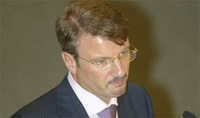Russia does not think WTO membership provides economic bliss
German Gref called on the deputies not to fear the WTO.

The minister of economic development, German Gref, who is directly responsible for Russia ’s joining the World Trade Organization (WTO), in his speech at the Duma’s federal hour tried to soften the government’s overly harsh remarks concerning the perspectives for this process.
“I hope that we can find an agreement with our American partners. Right now we are going through a very constructive round of negotiations,” he said, “And all the two-party negotiations can be completed by the end of this year, but the more significant ones with the U.S. should be over by the end of October."
However, the minister could not name even the potential deadlines for completing the multi-party talks. “Lord willing we’ll reach those by the end of 2007 but it may be even longer,” he told the deputies, “This means that Russia might not make it into the WTO by the end of Vladimir Putin’s term.”
As became known last week the president’s advisor, Igor Shuvalov, who represents Russia in the G-8 Summit claimed that the process of joining the WTO will almost definitely face obstacles. “As I understand it we have arrived at the final point, to the definitions of our marginal positions, and we can no longer yield them in any direction,” he told the pres-conference.
Currently the question concerning the veterinary control of American meat has become a stumbling block in the talks with the United States . In August German Gref made an announcement in which he promised to re-evaluate the contract with determined quotas of meat shipments to Russia if the U.S. doesn’t give its approval for Russia to enter the WTO.
This time he preferred to withhold any further sharp remarks. “The issue is very sensitive, and I would like not to comment on it. I hope that we can find a common ground with our American colleagues and that we both will refrain from making mutual commercial claims,” he said.
Even so the nation’s elect were no so much concerned about Russia ’s chances of becoming a member of an international trades club. They questioned whether the country needs it at all.
The deputies asked again and again whether such a move would leave the nation’s cattle industries, automobile industries and insurance agencies unharmed. “Explain, why do we import Australian cows?” Oleg Malyshkin, a deputy of the LDPR fraction and a former presidential candidate, addressed the minister. “In order to milk them,” Mr. Gref suggested after some thought.
Another likbez (survey aimed at fighting the public ignorance) recently showed that everyone in general would benefit from the potential WTO membership .Only certain companies may have to overcome individual difficulties but these challenges will not be systematic in nature.
Instead it is the foreign providers who need to worry about Russian competitors. “European and American authorities should be expecting many of their firms to close down,” Gref said.
At the present time nearly 130 discriminating procedures work against Russian producers even though Russian materials are quite capable of posing a competition, and oftentimes they are if higher quality than the analogous foreign imports. According to the minister, joining the WTO would also allow Russian farming and pharmacy to reach their place in the international market.
“All the possible consequences for the Russian financial market have been analyzed in detail,” – the minister claimed. However, he refused to comment on the conditions of the agreement by saying that the talks had not yet been finished.
This is rather surprising since it was announced the day before the G-8 Summit in St. Petersburg that a compromise with the U.S. concerning this issue had already been found. It was assumed that while Russia prevents foreign banks from establishing their direct filials inside the country, it would not give its approval to the foreign insurance companies seeking to do the same.
“And besides,” Gref continued, “thanks to the efforts of Russian negotiators we were able to solve the question of equating the internal and external gas prices. The only responsibility we agreed to take upon ourselves is to make sure that the tariffs for the industrial consumers inside our country would never be set below the gas production costs,” the minister assured the deputies.
On top of all that, WTO would provide a more effective way of fighting the “grey” import. Currently 70-80% of imported goods make their way into Russia without going through the customs check, which according to the minister, resulted in “practically total loss of the sector of shoe industry” and “obstacles for electronic development.”
After Russia joins the WTO, the minister insisted, “there will be much more order,” and if the import begins to rise steeply WTO standards would provide for protective measures.
“The level of tariff security would be twice as heavy as that of the developed European nations and of the U.S. and one-and-a-half times higher than that of Ukraine ,” German Gref claimed. An average tariff for imported goods would see an insignificant decrease, while no change should occur for any of the Russian-produced goods intended for domestic consumption.
Vremya Novostei
Translated by Natalia Vysotskaya
Pravda.ru
Subscribe to Pravda.Ru Telegram channel, Facebook, RSS!


